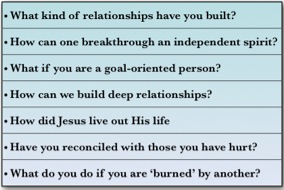 The Pursuit of Independent Success
The Pursuit of Independent Success
-The Discovery of Loving Relationships-
Ecclesiastes 4:9-12 – The Bible Teaching Commentary
Paul J. Bucknell
Independent Success | Ecclesiastes 4:9 | Ecclesiastes 4:10-12 | A Look at Our Lives | Bible Study Questions'A Look at Our Lives' is part 4 of 5 of an expository study on Ecclesiastes 4:9-12 which asks and answers seven questions from Ecclesiastes 4:10-12 on the practical aspect of building relationships.
'A Look at our Lives' from Ecclesiastes 4:10-12
 Relationships are important. People are important. Yes, you can get somethings done better without the fuss and time of people and their individual particularities. But in the end, you are saying a lot of what you believe and who you are by the way you associate with others.
Relationships are important. People are important. Yes, you can get somethings done better without the fuss and time of people and their individual particularities. But in the end, you are saying a lot of what you believe and who you are by the way you associate with others.
Some of us are people-persons. They are energized by others. Others are task-oriented. Relationships get very tedious. We in fact need each other no matter what our makeup. If not for any other reason, it is to eliminate that chase of the cancerous independent spirit. For that in the end will condemn us. Let me close by asking some questions and making a few comments.
- What kind of relationships have you built? Have you built a lone empire or established friends?
If you have not consciously built friendships with those around you including your spouse, then unless you are a people person, you do not have them. You are not prepared for crisis. One day, you will discover how things do not fulfill you. You will see your life setting under the sun. It has gone by and there is nothing that remains.
- Do you have that independent spirit? How can you breakthrough?
God provides two guideposts. The way you play the game is more important than the game itself.
(1) Never disobey. In other words, don’t lie to get your way. Don’t do wrong. Live righteously. Whether everyone around else around you does wrong, don’t you.
(2) Be loving. Follow the course of ‘doing to others what you would like done to yourself.’ You cannot fail with this philosophy of life, even if they are your competitor or enemy.
- What if you are a goal-oriented person and don’t inherently value relationships?
The goal-oriented person will not naturally think much of building relationships. Everyone likes friends, but goal-oriented people can more easily ignore this need in their lives. Generally speaking, women are much better at relationships while men at performing tasks. Men typically think much of their work and are not very aware of the needs or situation about them. Husbands typically think they have better marriages than their wives do. Those who are goal-oriented need to make relationships a priority. It might be like driving a car at first–very awkward. Each step is difficult. “Call someone? What would I say?” They need to do it because they are called to love one another. God will bless them through this.
- How can we build the trust up in our relationships so they become real and not phony?
We firstly must become intolerant towards ‘polite’ relationships. We know there is a better kind of relationship which we will pray and work toward. Secondly, we need to see what offenses have been made and seek reconciliation. Thirdly, we need to see what common purpose God has given you and the other to work together. Lastly, remember that you need their input. Even if it is different, keep asking why God is introducing that variable. Everyone is important.
- How did Jesus live out His life? Independent or as coworkers? What is the results?
When we study the life of Jesus, we find that the most able and spiritual One chose to work closely with and through others. He made a costly commitment to others. We must also. But frankly, unless we believe there will be a greater good that comes from the relationship and all the time that is taken (this is for the analytical person), then one will not reach down deep enough to build those relationships. Our faith in God’s promises and directives need to start shaping how we live.
Many of us have swallowed a lie and believe that a greater good comes from keeping isolated and independent rather than close and intimate. You think focusing on your goals is the only way to graduate or get ahead. You might have been scarred in your past or never seen such a relationship work out in your family. That is unfortunate, but if you do not change, you will go against God’s good principles of life demonstrated by Christ.
- What relationships have you burned? Have you sought reconciliation?
If you are the goal-oriented kind of person, you need to stop in your tracks and ask God to help you evaluate your situation. Most people that forge ahead with their plans are very insensitive to others. More than likely, you have hurt many people around you. Now is the time to straighten things out.
You might, for example, tell others that God is working in your heart and that you tend to be insensitive to others and might in fact have hurt him or her or others while trying to achieve your goals. Tell them you are now trying to mend those relationships. Then ask if you have somewhere along the line been insensitive to them. When you humbly show people your quest to change, then people are more willing to open up and be honest. When is it time to do that? Now!
- What if you are burned (hurt) by others?
You might have been the victim of another person’s insensitivity. It might have happened when a person seemed so kind and helpful but later were rejected by him. Your contribution is ignored. You get no extra compensation for your extra work. These are difficult times. Let me make a few suggestions.
 Pray and love your enemies. The person who uses you still needs to be loved. He is covered in darkness. God wants to use you to show love. Trust the power of God’s love.
Pray and love your enemies. The person who uses you still needs to be loved. He is covered in darkness. God wants to use you to show love. Trust the power of God’s love.
Never doubt your contribution. If you have worked hard, it should primarily be because God has called you to a task. God will reward you as He sees fit. It might be in heaven before you see that reward, but faithfulness is faithfulness and God loves that. Trust Him with that. Do not allow yourself to shrink back from hard work. It is proper.
Learn from this. The next time, if it is possible, before you rent an apartment or get a job, ask people how it is to live there with that landlord or work under that person. You can prevent yourself from extra pain by doing this. In fact, you should pray and look for a position that treats people nicely. The process is as important as the task.
Conclusion
Two are better than one!
By making a special commitment to treasuring and learning from people around you, you become a special conduit of God’s love and wisdom to others. Working together produces many things that we would never be able to otherwise predict or plan for.
Bible Study Questions for Ecclesiastes 4:9-12 =>
The Book of Ecclesiastes - The Bible Teacher's Commentary |
||
| Ecclesiastes introductory | Outline of Ecclesiastes | Design & Purpose of Ecclesiastes |
| Ecclesiastes 2:1-11 | The Pursuit of Pleasure | Cycle of Satisfaction |
| The Pleasure Cycle | Bible Study Questions | |
| Ecclesiastes 3:1-22 | Bible Study Questions and Short Commentary | |
| Ecclesiastes 4:9-12 | Independent Success | Ecclesiastes 4:9 |
| Ecclesiastes 4:10-12 | A Look at Our Lives | |
| Bible Study Questions | ||
BFF Homepage | Top | Back | Bible Articles | Topic Index | BFF Resource Center
Check out the BFF Resource Center where this and many hundreds of articles can be found in printable form (pdf) and
oftentimes, as in this article, in powerpoint too.
-
Biblical Foundations for Freedom
Rev. Paul J. Bucknell